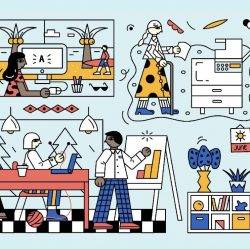June 25, 2019
Tech laggards face extinction unless they innovate
 Many larger businesses are struggling to implement digital transformation in spite of the dangers to their long term survival, a new joint report from CBI and Oracle claims. According to Bigger, Faster, Stronger, the improved adoption of technology could unlock productivity and wage growth. Research shows that more adoption, coupled with better management practices, could add £100 billion to the UK economy and cut income inequality by 5 per cent. However, only 54 per cent of UK companies believe disruptive technologies play an important role in their organisation, much lower than in countries such as France, Germany, India and Russia. More →
Many larger businesses are struggling to implement digital transformation in spite of the dangers to their long term survival, a new joint report from CBI and Oracle claims. According to Bigger, Faster, Stronger, the improved adoption of technology could unlock productivity and wage growth. Research shows that more adoption, coupled with better management practices, could add £100 billion to the UK economy and cut income inequality by 5 per cent. However, only 54 per cent of UK companies believe disruptive technologies play an important role in their organisation, much lower than in countries such as France, Germany, India and Russia. More →















 It’s been
It’s been 










 A significant number (37 per cent) of workers (11 million people) in the UK worry their job will change for the worse and 23 per cent (7 million people) are concerned that their current job may no longer be needed, claims a survey into the impact of automation over the next decade. In the survey, carried out to mark the launch of a new Commission on Workers and Technology chaired by Yvette Cooper MP, workers were 73 per cent confident they can adapt to technological change and update their skill if automation affects their job and over half think (53 per cent) are optimistic that technology change will be good for their working lives.
A significant number (37 per cent) of workers (11 million people) in the UK worry their job will change for the worse and 23 per cent (7 million people) are concerned that their current job may no longer be needed, claims a survey into the impact of automation over the next decade. In the survey, carried out to mark the launch of a new Commission on Workers and Technology chaired by Yvette Cooper MP, workers were 73 per cent confident they can adapt to technological change and update their skill if automation affects their job and over half think (53 per cent) are optimistic that technology change will be good for their working lives. 







